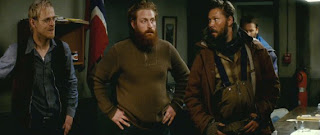Zero Dark Thirty is the somewhat true-ish tale of the hunt for Osama Bin Laden
 |
| Above: Dan, scraping some "torture juice" off his shoes |
 |
| She went in a novice and left a female David Caruso. YEAAAAHHHH! |
If nothing else, Kathryn Bigelow does an excellent job subverting expectations with Zero Dark Thirty. This is less of a war movie or a manhunt than it is a police procedural. In that regard, it's a pretty solid one. Jessica Chastain fills the role of the obsessive person who just knows that they're right capably, and Bigelow does a good job making her look like the most capable person in the room at any given time. When it finally gets to be Zero Dark Fifteen-ish, Bigelow shifts gears and reminds audiences that she knows how to add tension to military scenes.
What I found most interesting about Bigelow's approach to the material was that it felt surprisingly light on judgement. The torture scenes seemed to affect the characters just as much as suicide bombers, or the final assault on Bin Laden's complex. This could easily have been a propaganda piece, like The Green Berets, but Zero Dark Thirty strove for a much more documentary feel.
As a movie that is, essentially, a procedural with documentary tones to it, Zero Dark Thirty is not a great spotlight for acting. Jessica Chastain was pretty good as the emotional core of the film, but even her fairly rounded character exhibited frustration more than anything else. She did morph into a convincingly bad-ass intelligence agent, but I felt that the personal investment of the character --- which was mind-numbingly large --- didn't translate into her performance.
Jason Clarke was impressive in a supporting role; the more I see of Clarke, the more I like him and truly believe that he's close to a breakout role. He had one of the more despicable parts in the film, but he gave it some unexpected humanity, too. Most of the rest of the film was filled with bit parts, and many of them were played by character actors. Still, in the cast of thousands, there were some familiar faces. On the political side of the plot, Kyle Chandler was (once again) a bureaucrat, Mark Strong was a sneakier type of bureaucrat, James Gandolfini was kind of a military bureaucrat, and John Barrowman essentially acted as Jessica Chastain's hype man with his sole line. All of those are good actors, but only Mark Strong had an opportunity to show off any (which he did). On Maya's team, Harold Perrineau made a very brief and very welcome appearance and Jennifer Ehle was pretty good as the intelligence character that always seemed to be wrong. When the story turned to the military side of things, Chris Pratt and Joel Edgerton were the face of the strike team. Pratt was surprisingly engaging as a slight goofball, while Edgerton played his part more through glaring than with dialogue.
 |
| Their haircuts match their characters |
Okay, I've covered the plot, the direction and the acting. What about all that torture? On the one hand, I can agree (to an extent) with the argument that acceptance can be construed as condoning. I honestly don't get where people are coming from when they say that the overall message here is that torture was necessary to find Bin Laden. At worst, this film takes an indifferent stance on the issue. Of course, the message is not that torture did no good, either; information gleaned through torture did eventually lead to the film's climax, but the methods are not shown as heroic or even necessary evils. As with so much of Zero Dark Thirty, it would be so much easier to derive meaning and intent if this film had given in to machismo or back-patting nationalism. Instead, the audience is subjected to extended periods of unpleasantness as the detainees are tortured on-screen. If there is a message in Zero Dark Thirty about torture, I would argue that it is closer to "torture sure is messed up, right?" than anything else.
I was not sure how I felt about Zero Dark Thirty when it ended. It certainly did not live up to my expectations, but that is not a bad thing. This was a substantially different film than I was expecting, and I respected the emotionally-neutral choice of tone. I would have preferred something that asked questions instead of simply reported issues, but that would have fundamentally altered Bigelow's documentary-feel. I wish it had felt more immediate, though. I was so separated from the emotions of these characters that the exits of Kyle Chandler and Jennifer Ehle had no impact on me, much less anything that happened to Jessica Chastain. Everything just felt too impersonal. That can happen in procedural dramas, but the main character's charisma or brilliance helps keep things exciting as the audience is drip-fed clues. Chastain was at her best in conference room scenes, convincing bureaucrats to believe her.
 |
| There was a shocking amount of whatever you want to call this |
































